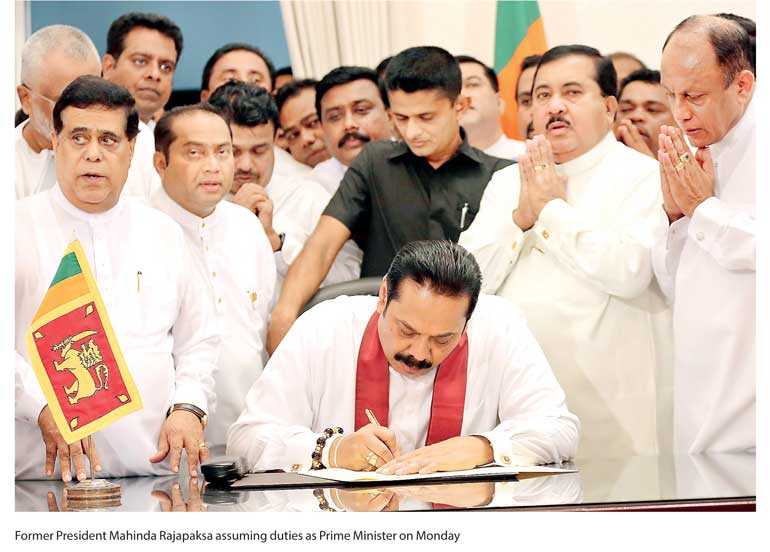Saturday Feb 14, 2026
Saturday Feb 14, 2026
Wednesday, 31 October 2018 00:00 - - {{hitsCtrl.values.hits}}


Please read with an open and objective mind. The Constitution of the Democratic Socialist Republic of Sri Lanka is not the property of politicians, professors, justices or lawyers. It is the property of the people of Sri Lanka and we the people have the right to read, understand and apply the Constitution without bias. Following is the order of events and relevant Constitutional articles by which the new Prime Minister
was appointed:
1. The National Government ends
46. (5) For the purpose of paragraph (4), National Government means, a Government formed by the recognised political party or the independent group which obtains the highest number of seats in Parliament together with the other recognized political parties or the independent groups. – The Constitution of the Democratic Socialist
Republic of Sri Lanka (Page 42)
Application: As per the above article, the National Government which was formed between the United National Party and the Sri Lanka Freedom Party was ended with the formal withdrawal of the SLFP from the National Government, as per its constitutional definition.
2. Cabinet of Ministers ends
42. (1) There shall be a Cabinet of Ministers charged with the direction and control of the Government of the Republic. – The Constitution of the Democratic Socialist Republic of Sri Lanka (Page 40)
Application: As per the above article, when there is no government, there can be no Cabinet of Ministers. Therefor with the ending of the National Government, its Cabinet of Ministers ceases to exist constitutionally.
3. Prime Minister’s tenure ends
46. (2) The Prime Minister shall continue to hold office throughout the period during which the Cabinet of Ministers continues to function under the provisions of the Constitution unless he –
(a) resigns his office by a writing under his hand addressed to the President; or
(b) ceases to be a Member of Parliament. – The Constitution of the Democratic Socialist Republic of Sri Lanka (Page 41)
Application: As per the above article, since the Cabinet of Ministers ceased to exist, MP Ranil Wickremesinghe’s Prime Ministership too ended simultaneously and constitutionally.
4. Appointing of a new Prime Minister by the President
42. (4) The President shall appoint as Prime Minister the Member of Parliament, who, in the President’s opinion, is most likely to command the confidence of Parliament. – The Constitution of the Democratic Socialist Republic of Sri Lanka (Page 40)
Application: As per the constitution, the President appointed MP Mahinda Rajapaksa as the new Prime Minister. Therefore it can be concluded that the appointment of the new Prime Minister was legitimate and constitutional. Your questions and challenges are answered below.
Frequently asked questions
Q: Where does it say in the Constitution that the Government will end when one party leaves the National Government?
A: The Constitution does not spell out common sense. The basic premise of the “National Government” as per the Constitution 46, is that it is has more than one party working together. When one of the two or more parties withdraw, that original Government is no more. It’s common sense. However, the UNP could have signed a new agreement with another one or more party and form a new National Government, which they have not done.
Q: What about other parties in the National Government?
A: The National Government was formed by signing an agreement between the United National Party and the Sri Lanka Freedom Party. Therefore when SLFP formally withdrew, the National Government ended.
Q: Where does it say in the Constitution that the Cabinet of Ministers will end with the ending of the Government?
A: 48. (1) On the Prime Minister ceasing to hold office by death, resignation or otherwise, except during the period intervening between the dissolution of Parliament and the conclusion of the General Election, the Cabinet of Ministers shall, unless the President has in the exercise of his powers under Article 70, dissolved Parliament, stand dissolved and the President shall appoint a Prime Minister, Ministers of the Cabinet of Ministers, Ministers who are not members of the Cabinet of Ministers and Deputy Ministers in terms of Articles 42, 43, 44 and 45 (The Constitution of the Democratic Socialist Republic of Sri Lanka (Page 43) As per the above article, the Prime Minister may cease to hold office by death, resignation or “OTHERWISE ”. The Prime Minister ceased to hold office NOT by death or resignation, BUT by a reason OTHERWISE, which is the ending of the Cabinet of Ministers which was in turn caused by the ending of the National Government as explained above in points 1 and 2.
Q: Shouldn’t MP Mahinda Rajapaksa prove that he has a majority support in the Parliament to be appointed as the Prime Minister?
A: As per the Constitution 42, it is entirely the President’s decision to appoint an MP who he/she opines is most likely to command the confidence of Parliament. There is no mentioning of “majority” or “support”.
President Maithripala Sirisena used this exact constitutional power to appoint MP Ranil Wickremesinghe immediately after he was sworn in in January 2015; while an elected government with a functioning Cabinet of Ministers was in office.
Q: But isn’t the President unable to remove the Prime Minister according to the 19th Amendment to the Constitution?
A: There is no such wording in the Constitution stating that the President is not allowed or is unable to remove the Prime Minister. There is a document being circulated on Social Media called ‘A Brief Guide to the Nineteenth Amendment’ by the Centre for Policy Alternatives dated May 2015. It is a list of proposals that were made by the authors back in 2015.
However no such amendment was made to the Constitution. The relevant amendment is Article 46 (2) (which states that) The Prime Minister shall continue to hold office throughout the period during which the Cabinet of Ministers continues to function under the provisions of the Constitution unless he –
(a) resigns his office by a writing under his hand addressed to the President; or
(b) ceases to be a Member of Parliament.
Therefor it is a gross misleading of the public to say that the 19th Amendment does not allow the President to remove the Prime Minister.
Q: Shouldn’t this all be decided in the Parliament?
A: The President could have let the Parliament form a new government after the National Government ended with the SLFP’s withdrawal, but he is not bound to do so constitutionally. Given the extraordinary circumstances leading to this event, he may have decided not to let the Parliament decide.
Q: But then isn’t it undemocratic?
A: Sri Lanka’s democracy is structured between the Executive Presidency, the Parliament and the Judiciary due to a variety of reasons. The President is an elected representative as much as the members of the Parliament are. Given that the members of Parliament can crossover, it does not fully honour the people’s mandate, and therefore cannot be considered as a fully democratic institution. However, this is a good example of the reason why we need to strengthen the Parliament as a full democratic institution through genuine constitutional amendments.
Q: Aren’t you a supporter of MR just trying to whitewash this?
A: I am an ordinary citizen who believes in and promotes democracy. As a citizen I have the freedom to hold and express any political view as I wish, a right given to me by the Constitution 10. (2) No citizen shall be discriminated against on the grounds of race, religion, language, caste, sex, political opinion, place of birth or any one of such grounds.
I am a strong supporter of the Constitution 1. Sri Lanka (Ceylon) is a Free, Sovereign, Independent and Democratic Socialist Republic and shall be known as the Democratic Socialist Republic of Sri Lanka. I am a strong supporter of the Constitution. 2. The Republic of Sri Lanka is a Unitary State. Therefore I strongly stand against the internal and external forces acting against the preservation of above constitutions. I do not see this as a win by Mahinda Rajapaksa. I see this is as a legitimate and timely defeat of the forces acting against Sri Lanka.
(The writer is Ambassador for Democracy Earth and can be reached via [email protected].)